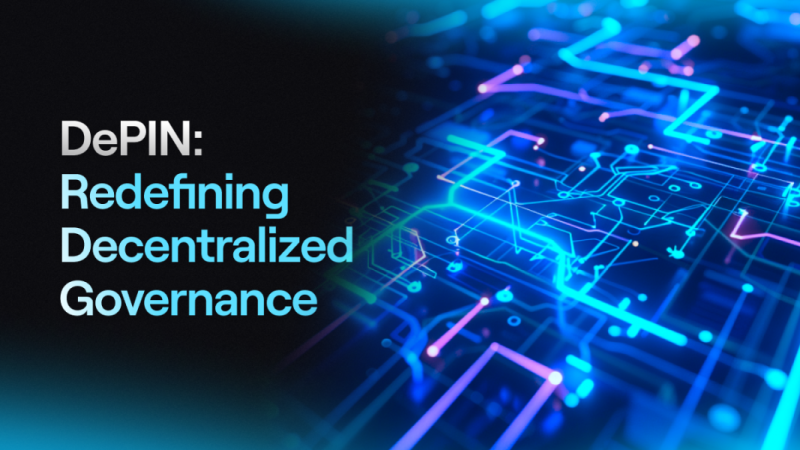How DePIN Crypto is Redefining Decentralized Governance

Categories :
Decentralized governance is a cornerstone of the blockchain and cryptocurrency world, promoting transparency, inclusivity, and community-driven decision-making. One of the most exciting developments in this space is the emergence of Decentralized Physical Infrastructure Networks (DePIN), which leverage DePIN Crypto to transform the way infrastructure projects are managed. This blog explores how DePIN Crypto is redefining decentralized governance and empowering communities to take control of their infrastructure development.
Understanding DePIN and Decentralized Governance
Decentralized Physical Infrastructure Networks (DePIN) are a revolutionary approach to infrastructure management that harnesses the power of blockchain technology and decentralized governance. Traditional infrastructure projects are typically managed by centralized authorities, leading to inefficiencies, lack of transparency, and limited public involvement. In contrast, DePIN projects distribute decision-making power among a network of participants, ensuring that infrastructure development reflects the diverse needs and priorities of communities.
The Role of DePIN Crypto in Governance
DePIN Crypto plays a crucial role in enabling decentralized governance within DePIN projects. By issuing DePIN Crypto tokens, projects can empower participants to engage in governance activities and shape the direction of the network. Token holders have the ability to propose and vote on initiatives, allocate resources, and make collective decisions. This democratic approach ensures that all stakeholders have a voice in the development and management of infrastructure projects.
Key Features of Decentralized Governance with DePIN Crypto
- Transparent Voting Mechanisms: DePIN Crypto enables transparent and secure voting mechanisms through blockchain technology. Every vote is recorded on an immutable ledger, ensuring that the process is tamper-proof and verifiable. This transparency fosters trust among participants and ensures that governance decisions are made based on accurate and reliable data.
- Community-Driven Proposals: DePIN projects encourage community-driven proposals, allowing participants to submit ideas and initiatives for consideration. Token holders can vote on these proposals, ensuring that the network evolves in a way that reflects the collective interests and priorities of its members. This inclusive approach fosters innovation and responsiveness, driving continuous improvement in infrastructure management.
- Resource Allocation: Decentralized governance with DePIN Crypto also extends to resource allocation. Participants can vote on how resources are distributed, ensuring that funds and assets are allocated efficiently and effectively. This collaborative approach ensures that resources are used to address the most pressing infrastructure needs and challenges.
Case Study: NATIX Network
The NATIX Network is a prime example of how DePIN Crypto is redefining decentralized governance. By leveraging DePIN Crypto tokens, NATIX empowers its community to actively participate in governance activities and shape the direction of the project. Participants can propose and vote on initiatives related to infrastructure development, resource allocation, and network improvements. This democratic approach ensures that the NATIX Network remains transparent, accountable, and aligned with the interests of its community members.
Benefits of Decentralized Governance with DePIN Crypto
- Inclusivity and Participation: Decentralized governance with DePIN Crypto ensures that all stakeholders have a voice in decision-making processes. This inclusivity fosters a sense of ownership and engagement among participants, driving active participation and collaboration.
- Transparency and Accountability: Blockchain technology ensures that all governance activities are recorded on a transparent and immutable ledger. This transparency fosters trust among participants and ensures that decisions are made based on accurate and reliable data.
- Efficiency and Responsiveness: Decentralized governance allows for more efficient and responsive decision-making. By leveraging the collective intelligence of the community, DePIN projects can quickly adapt to changing needs and priorities, ensuring that infrastructure development remains dynamic and relevant.
Conclusion
DePIN Crypto is playing a transformative role in redefining decentralized governance within infrastructure projects. By leveraging blockchain technology and incentivizing community participation, DePIN projects are creating transparent, inclusive, and efficient governance models that empower communities to take control of their infrastructure development. As the DePIN ecosystem continues to grow, the role of DePIN Crypto in decentralized governance will become increasingly important, driving positive change and innovation in infrastructure management.
Call to Action
For more insights into how DePIN Crypto is redefining decentralized governance and empowering communities, visit the NATIX DePIN blog. Stay informed and engaged with the latest developments in the DePIN ecosystem and discover how you can become an active participant in this revolutionary movement.
Citiesabc was created by a team of global industry leaders, academics and experts to create new solutions, resources, rankings and connections for the world’s top cities and populations.










